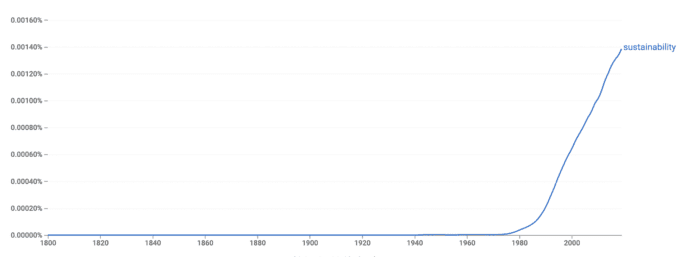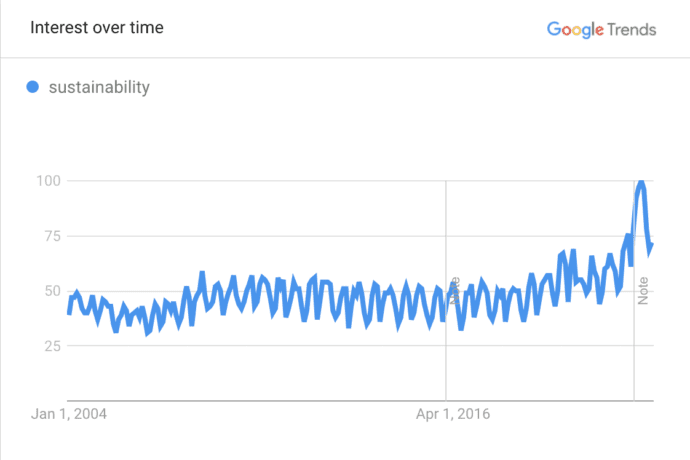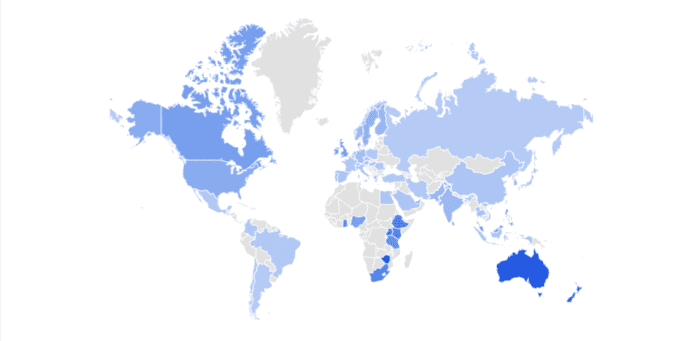I consider myself a bit of a Renaissance woman, which is probably why it’s pretty easy for me to get excited. There are a few things that get my brain so engaged, that I literally need a nap after thinking about them. Two of those things are language and data visualizations. (You thought I was gonna say dogs and food, didn’t you?) So when Kiwa asked me to write an article on sustainability, data and words are what I turned to first.
So let’s take a look at where sustainability is at and why this has any relevance to us coaches.
Words and Data
Good ol’ Google tells me that sustainability is “the ability to be maintained at a certain rate or level.” That’s the denotation or definition of sustainability. What about the connotation? For me, what comes up is: solutions to climate change, wanting to get things done in a way that can be done in that particular way long term, and doing things within one’s realm of capability and possibility.
It was interesting to reflect on the fact that sustainability is closer to stability than it is to novelty, yet the way we think about sustainability is “what is the new thing that we can put in place that will get us to a result we want and continue to get us this result for a long time.” It’s about invention and only then is it about stability. And when you think of invention, you don’t think “long-term.” You think “new, exciting, breakthrough.” Well, I do at least.
In this case, language led me into a thinking loop, which gave me a headache, so I turned to my other friend, data visualization.
Turns out sustainability is a relatively new term. It showed up in literature only in the 70’s. Interestingly, climate change first came on the scene in 1896, but it wasn’t until 1950’s that scientists began warning humanity of impending doom, and 1980’s are really when the climate change became a colloquial term (summary here).
“Sustainability” use in Literature over time

Google started keeping track of our online lives in 2004, and based on the continued increase in the literature (graph above), I thought we would see corresponding growth in internet trends, but I was wrong. Looks like things picked up a bit in April 2020 when the pandemic gave us all a slap in the face, but in general, it’s a bit of a flat trend – one might say that interest in sustainability has been quite sustainable.
Internet interest in sustainability over time

Internet interest in sustainability by country

So what does this all tell us? I’m no scientist, but my internet rabbit hole makes it seem that sustainability is a great word with great intentions, but it’s all talk, no action. Yes, that’s a hyperbole, but this is also a blog so I feel like it’s OK to make big statements to get people to think, “well, actually” and tell me how I’m wrong. That’s the whole fun of it!
Is sustainability a myth?
We’ve been talking about sustainability for 50 years now. The closer we look to the past, the more urgency we hear in people’s voices. There’s lots of “we need sustainable change now” and then nothing actually changes. I know it’s a complex issue when it comes to climate change in particular, but let’s look beyond that and at sustainability, in general, to see what I mean.
One of my least favorite, but oft-heard acronyms is VUCA. Annoyingly, it’s also an acronym that describes the world we live in very well so I can’t hate it too much. When you look at the components of VUCA – volatility, uncertainty, complexity, and ambiguity – do they sound like friends of sustainability or its enemies? (Told you I liked language…) In a VUCA world, is sustainability even possible?
It’s easy to dismiss that idea along the lines of “That’s the macro view, Magda. Individuals can achieve sustainability.” Can they?
Think about your day. Is it predictable? To what extent? Are there things you want to be different? Is your job perfect? Your relationship? Your body? Your mind? I’d argue that very few of the nearly 8 billion people on this planet (talk about not sustainable) will say there is absolutely nothing they would like to change in their lives. It’s not that they don’t have “the ability to be maintained at a certain rate or level” – it’s the level that they’re not happy with.
We always want more and we want it now. Rarely do we think about what is good enough and can make us happy long term. There’s always another thing we covet.
If we are always chasing more, are we just a bunch of hypocrites paying lip service to the concept? It’s like, “do as I say, not as I do” to an extreme level. What’s even the point? Be honest with yourself – is sustainability ever your goal? Or is it just incremental change you seek? What would it be like if you took the thing you want and modified it with the word “sustainably?” Is the goal less or more attractive?
Is sustainability even possible?
I think so, but it requires a change of mindset. I don’t know where I heard this, but I absolutely fell in love with this thought: what if we learned to want what we already have? Think about your day again. At some point in the past, at least some of the things you experienced were things you coveted. Then you achieved them and all of a sudden the goal post shifted again and those things weren’t enough. You had a chance to sustain that state, but you didn’t.
Here’s where a bit of coaching can come in handy. There are four questions I learned from Ram that I use when I self-coach myself, but they work brilliantly in all coaching as they bring out clarity in the outcome, measures of success, and the value of the desired outcome (to the client).
- What will you experience if you achieve what you want?
- What will you experience if you did not achieve what you want?
- What will not change in your experience if you achieve what you want?
- What will not change in your experience if you did not achieve what you want?
Once you have the clarity of the thing that you want, you can ask yourself a couple more questions to explore the sustainability aspect of your goal:
- What needs to change in your current experience to achieve what you want?
- Once you achieve what you want, what needs to happen in order for you to keep it that way?
Think back to your day and to the things you want to change. Ask yourself these questions in the context of the things you want to change. Are you still of the same opinion? Or are things actually OK as they are? If you still want a change, are you willing and able to do what it takes to make that change “stick,” to make it sustainable? Do you care? If not, then is the goal actually the goal you want?
Why does any of this matter?
I like a good thought experiment so for me personally, this rant on sustainability is an opportunity to reflect on my own life. Honestly, it has made me realize that there are some aspects I absolutely love and I know what do to (and I am willing to do) what it takes to keep them as they are. There are a few others that I need to rethink big time because what I’m doing is not sustainable. It’s leading to stress and it affects my well-being big time. I have a lot more thinking to do.
As coaches, we don’t give opinions. It’s our job to partner with our clients to help them achieve their goals and overcome their challenges. We ask questions to push our clients to thoughts they may not have thought on their own, often to uncomfortable places. Our role is not to put blinders on and tick some boxes so the client feels good about themselves. We’re also there to post the tough questions to not only get our clients to achieve their goals, but to be able to sustain their future state once they get there. Essentially, we’re always working towards getting fired by our clients because we don’t want them to depend on us. Sustainability is key to coaching outcomes, in my opinion. Otherwise, I don’t think we’re doing our job.
What do you think?



